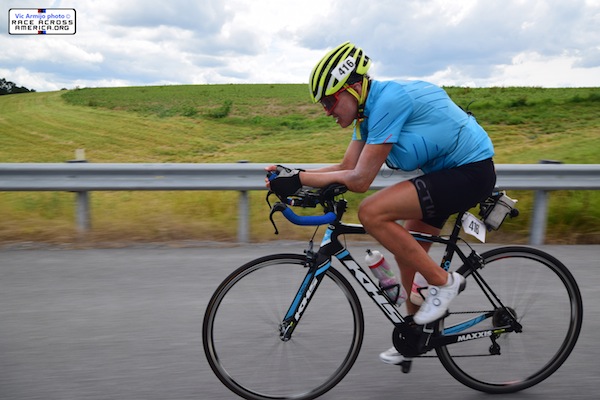Leah Goldstein is the first woman, and the first Israeli, to win Race Across America. (photo by Vic Armijo / RAAM)
Leah Goldstein became the first woman to win Race Across America in its 38-year history. The Vernon, B.C., resident also became the first Israeli to win the cycling tournament.
The 5,000-kilometre race – from Oceanside, Calif., to Annapolis, Md. – must be completed in under 12 days, and Goldstein completed it in 11 days, three hours and three minutes, rolling past the finish line at 9:41 p.m. on June 26.
“Race Across America (RAAM) is like no other race,” Goldstein told the Independent. “I’ve done the equivalent of the Tour de France for females. I’ve done major races and other ultra endurance races of 500, 800 miles, and nothing compares – because it’s not a matter of if, but when you’re going to experience all sorts of discomforts, back, neck, knee, constipation, diarrhea, swelling, some major saddle sores.”
This was the latest in a lifetime as a top athlete. Goldstein won the 1989 World Bantamweight Kickboxing Championship and was Israel’s duathlon champion. As a youth, she was a kickboxing champion and a Taekwondo champion. Later in life, she competed in a string of professional cycling events. That toughness carried forward to her becoming an officer in the Israeli commando and elite police unit.
This year’s race was particularly extreme, during a heat wave that punished riders with temperatures of more than 40°C; not just through the desert, but for the first eight days.
“That can break people down, where they almost feel defeated before they start, but that’s the thing with RAAM, those things are going to happen whether you like it or not, and you have to prepare for them,” said Goldstein. “It’s really something that pushes you far beyond your limits. You’re going to have more bad days than good days, and that’s just the challenge.”
During certain parts, she said she had hallucinations and her “brain felt like a potato.”
“I didn’t know what I was doing on my bike. I didn’t know where I was. And then you kind of snap out of it,” she explained. “It’s that element of the mental challenge of really pushing forward, knowing that whatever you’re doing, you just can’t get off the bike, no matter what the situation, the temperature, no matter what kind of pain you are in.”
It helped that this was her third RAAM, she said, and the crew was able to analyze past performance to build on it.
“We wrote down every single mistake that we made in 2019, with weather conditions, navigational problems, bike positioning, training, with sleep patterns, and we tried to perfect it as much as possible. And because of COVID last year, I had an extra year to prepare for this. I trained as if RAAM was still going to happen.”
Her onboard crew included a medic, a kinesiologist, massage therapists and nutritionists. “I think they know how I roll, and know how to read me on the bike, when I’m starting to fade or things are going sideways, or I’m low on nutrition,” she said. “We won as a team.”

Whereas riders fought the heat this year, they fought “uncontrollable rain and hail” two years ago. The crew prepared her with specialized clothing and pre-tested water-resistant equipment, just in case those conditions would prevail again.
“Prepare for the worst that possibly can happen, no matter how fully prepared you think you are,” she said. “It’s a matter of how badly do you want it, and how much are you willing to sacrifice.”
And Goldstein has experienced severe challenges. In 2005, during the Cascade Classic, she was involved in what she calls “the mother of all crashes” – she landed on her face at 80 kilometres an hour, “breaking practically every bone in my body, ripping my face right off.” Doctors were astonished she survived. In 2008, she was hit by a car, ejected 25 feet in the air and, in an attempt to cushion the fall, put her arms out, breaking both of them.
Neither accident kept her down. She returned to the racing circuit in 2011, winning the women’s solo category of Race Across America, breaking the previous record by 12 hours.
In 2016 she published a memoir, No Limits, outlining the triumphs and tragedies of her athletic life.
While the naysayers – who called her “insane and crazy” – said she was “past her prime,” the 52-year-old proved them wrong.
“Don’t use your age as an excuse or your past experiences as an excuse,” she said. “We don’t get second chances. What we got is what we got and, if you have a desire to do it, goddamn do it. What are you waiting for?”
Because of the high temperatures, the latest race took her a couple of days longer than expected, but she said the next one she plans on doing in under 10 days – and she’ll keep competing until she can’t anymore.
“If I’m alive at age 90 and I can still pedal my bike, I’m doing that race,” she said. “That’s my biggest goal.”
Dave Gordon is a Toronto-based freelance writer whose work has appeared in more than 100 publications around the world. His website is davegordonwrites.com.

